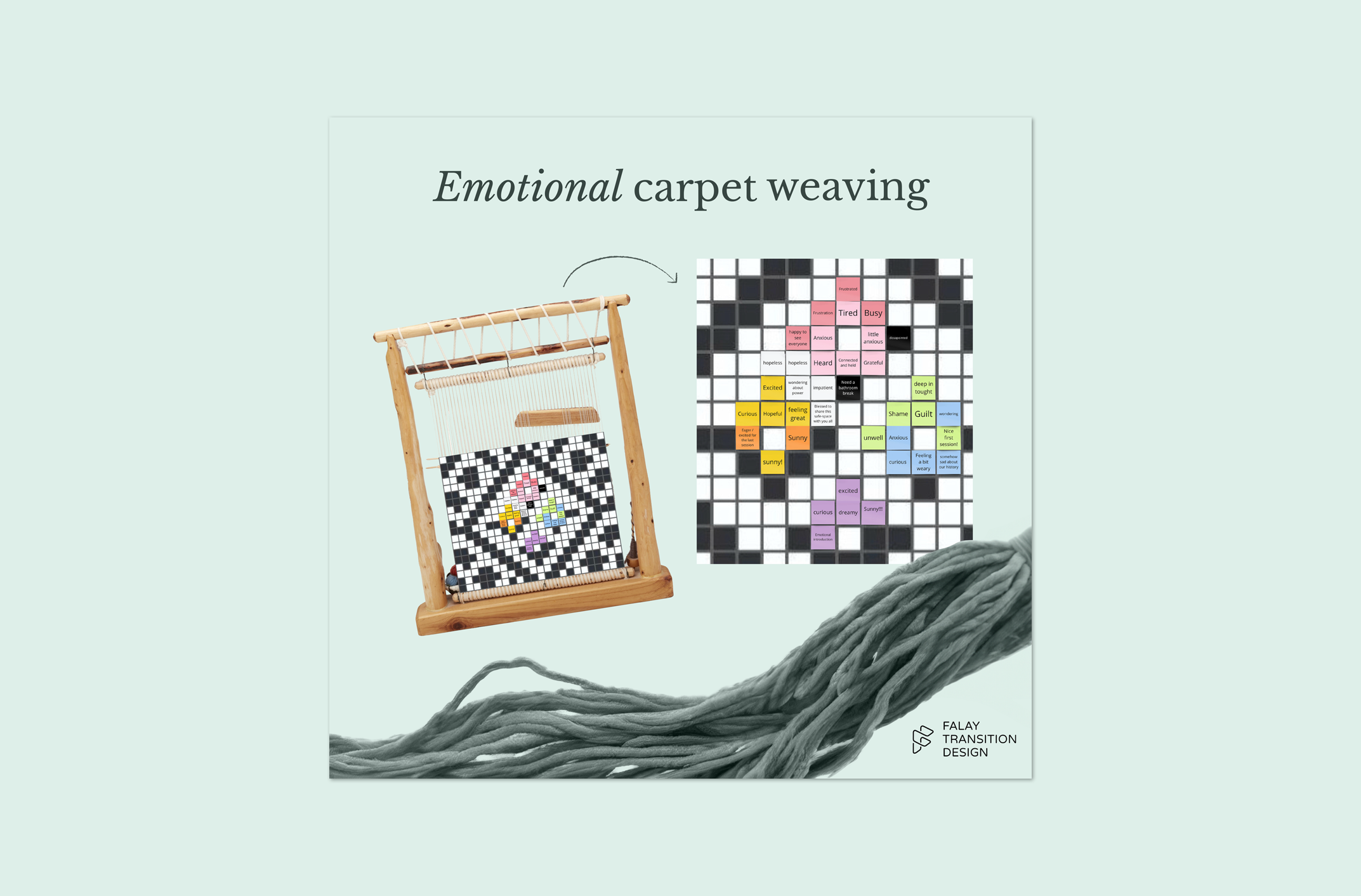Konkreettisten valtaa kumppaneille siirtävien ratkaisujen tarve oli vahva. Toisaalta dekolonisaatiossa ja vallan todellisessa siirrossa on kyse murroksesta, joka tulee muuttamaan kansainvälisten kehitysjärjestöjen roolia merkittävästi. Sellaista muutosta on vaikea hahmottaa samalla kun arki kutsuu nopeisiin päätöksiin totuttujen toimintatapojen avulla. Koimme myös, että globaalin etelän verkostojen edustajat eivät olleet vielä riittävän vahvasti mukana suomalaisessa keskustelussamme.
Päätimmekin edetä mahdollisten tulevaisuuksien kuvittelun kautta. Millainen olisi maailma, jossa kehitysyhteistyö on dekolonisoitu? Jos tuomme erilaisia valtaa ja globaalia solidaarisuutta pohtivia toimijoita yhteen, millaisena he näkevät roolinsa ja sitä ympäröivän maailman vuonna 2050? Mahdollisten tulevaisuuksien tunnistamisen ja kehollisen tuntemisenkin kautta olisi mahdollista avartaa ajattelua myös tarvittavista ratkaisuista, ajattelimme. Mitä kävikään? Lue alla olevasta blogista lisää ja tulee 23.9. Tampereelle Vallattomaan festariin!
Alla olea blogi on julkaistu aikaisemmin Falay Transition Designin sivuilla.
Dreamweavers: Transition Design Workshops with Fingo on Decolonising Aid
We recently completed a project with Fingo on the ”Decolonisation of Aid,” where we applied Transition Design methods and tools to reimagine the international development sector. We were joined by participants from the Finnish NGO sector, East and West Africa, and artists.
Testing methods for complex conversations
Discussing challenging topics such as decolonisation and power shifts in our current system can be emotionally charged, especially given our position as privileged actors who have benefited from historical injustices.
We embedded several methods in the process for mindful and compassionate conversations. Here are three new approaches we used to acknowledge and create space for complex emotions and systemic issues:
- Grounding Activity: We started with a calming breathing exercise and music to gently ease into the session, fostering presence and openness among participants.
- Emotional Carpet Weaving: We created a unique space for acknowledging and honoring the spectrum of emotions that emerged. Through the collective effort of placing colorful post-it notes on an empty grid, we wove together a metaphorical carpet of emotions.
- Acknowledgment of Historical Harms: Fingo team members Eppu and Senja began with an acknowledgment of historical injustices, addressing the enduring legacy of colonialism and white supremacy within international development, setting the stage for accountability and meaningful change.
The Transition Design process
In the 3 online workshops, we also used our Falay Transition Design Canvases to facilitate the conversation. Here is a short overview of the project steps:
1. Mapping Current System
In the first workshop, we mapped the qualities and characteristics of the current system of power within the international development sector. We held conversations within our diverse participant group about the historical elements and deep mental models that sustain the current structures.
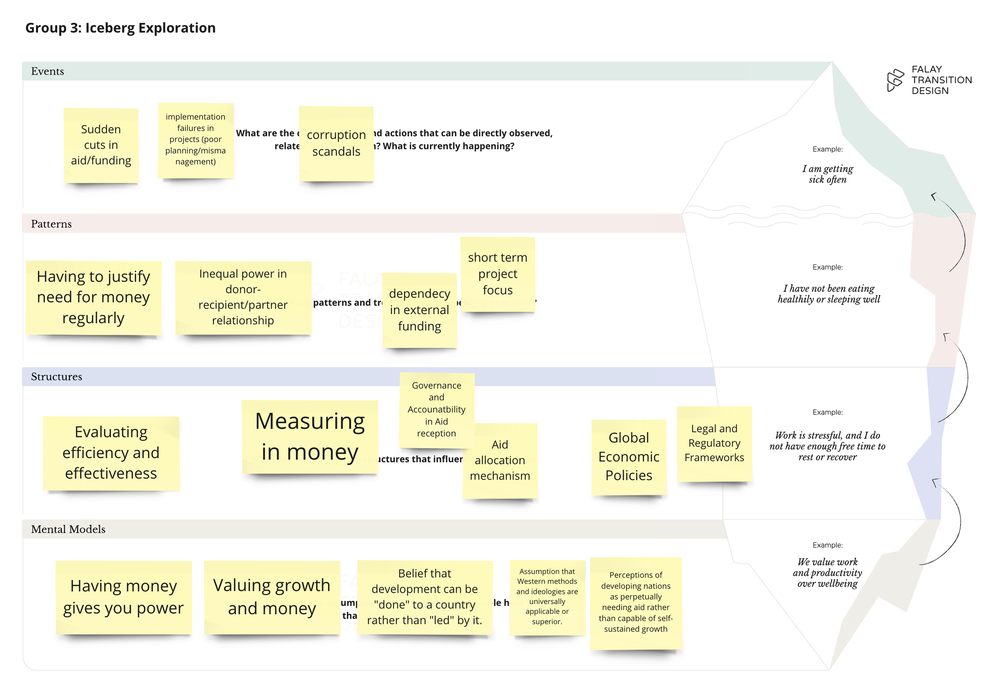
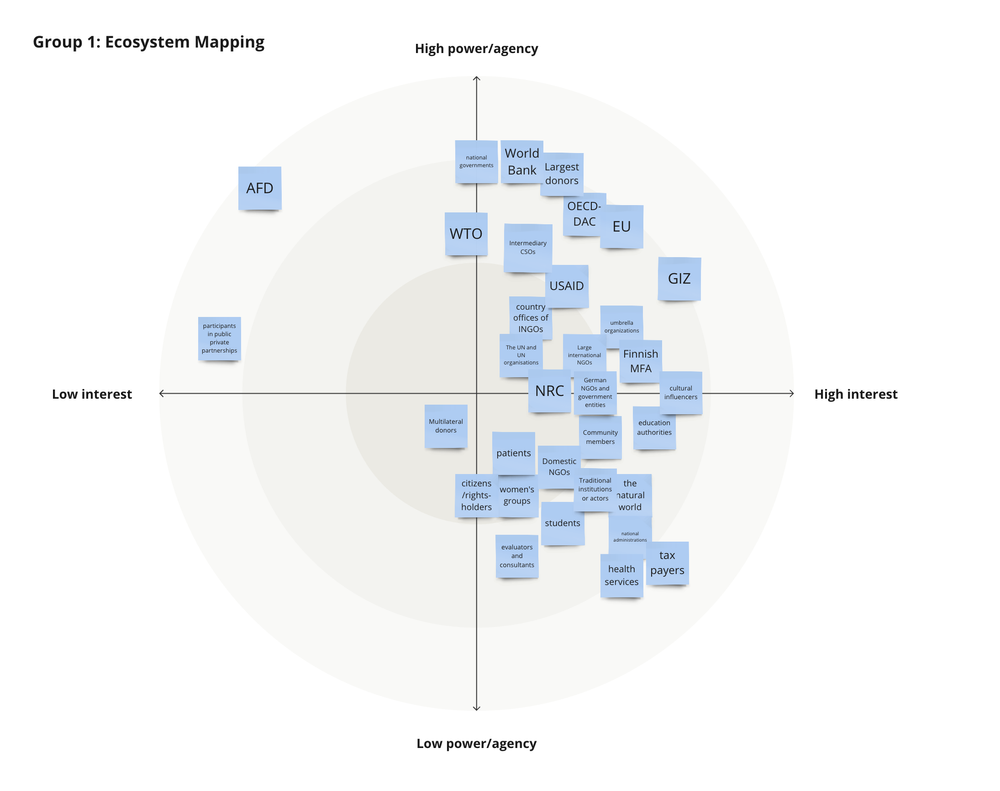
2. Imagination of Desirable Future System
In the second workshop, we conducted a guided imagination meditation that transported participants to the year 2050. We envisioned a time when systems act with reverence, respect, reciprocity, and responsibility toward people and the planet. Participants wrote engaging stories from different stakeholders’ perspectives, sharing these narratives as postcards from the future.
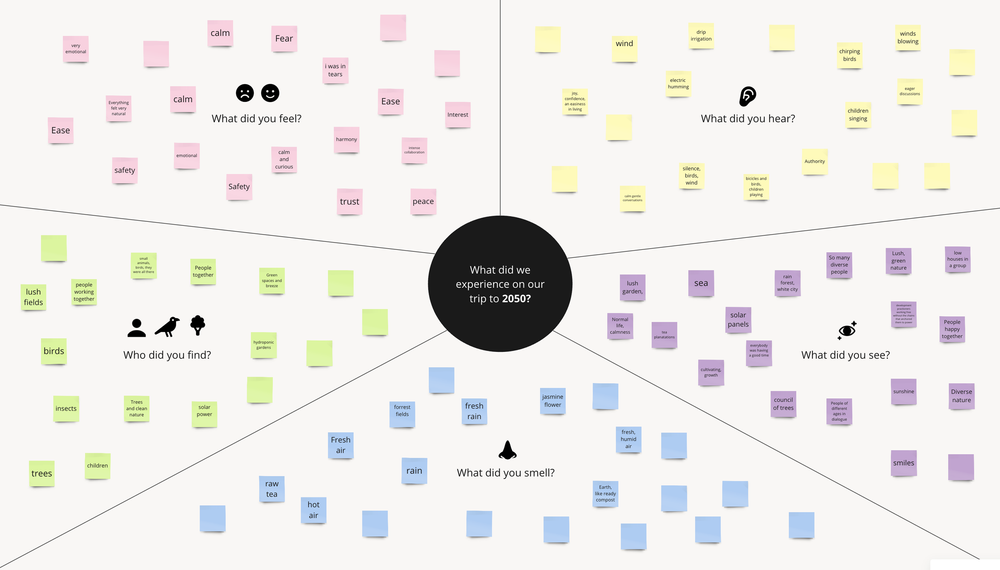
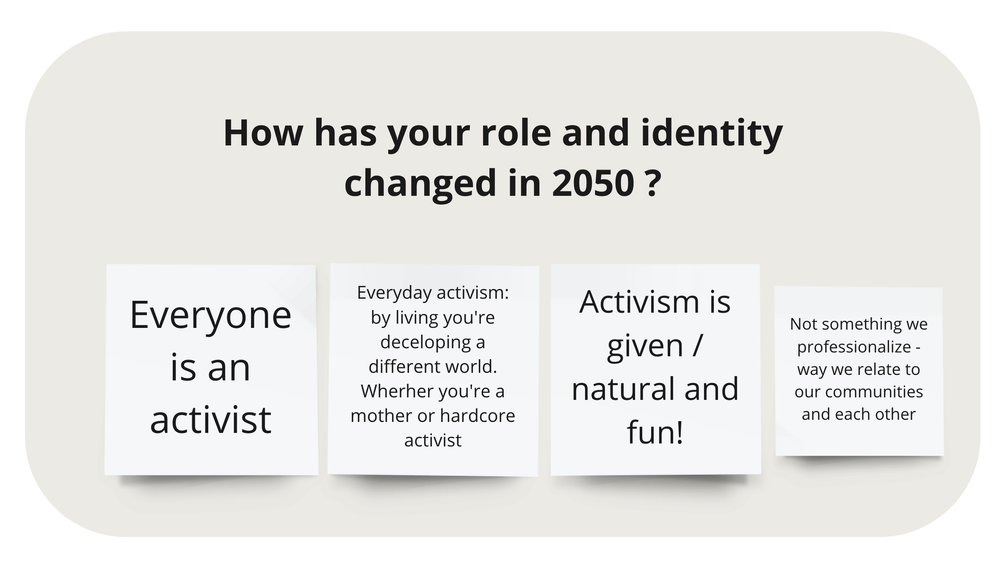
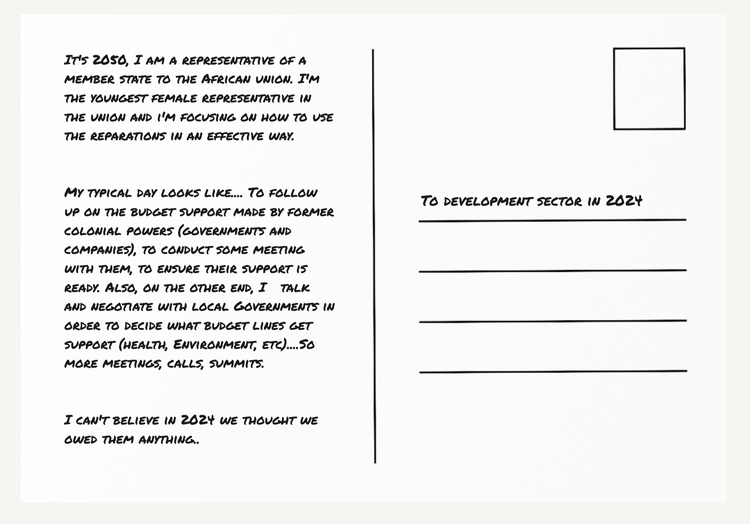
3. Building Transition Pathways
In the third and last workshop teams built transition pathways from today’s system to the future and identified steps and possible interventions that might aid this transformation.
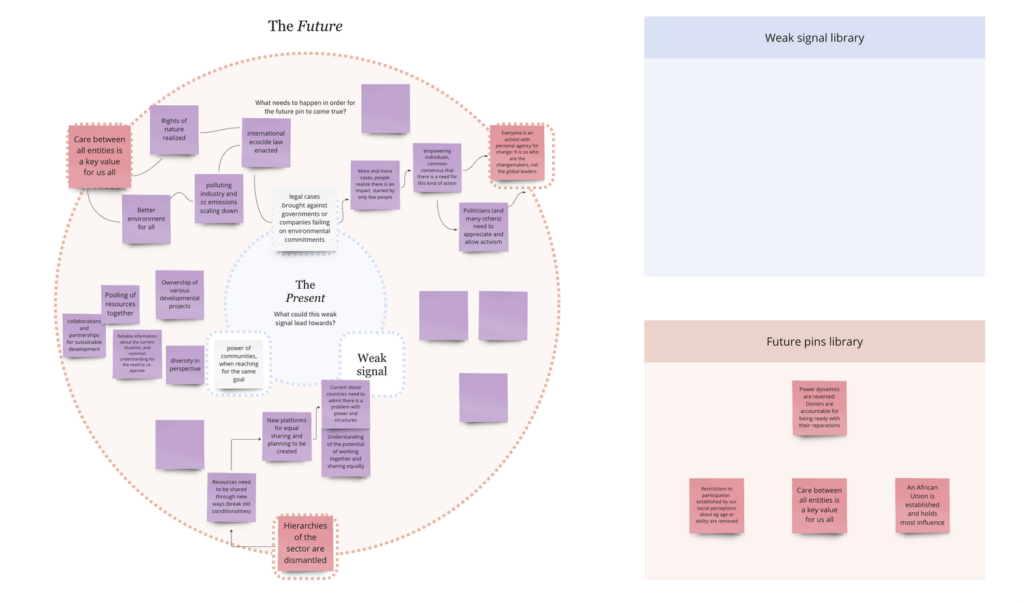
The process was received with a lot of appreciation from the participants’ perspectives. The outcomes of this Dreamweavers workshop will be used by the artists in Tampere, Vallaton Festival in Autumn.
“I wish to extend my sincere appreciation to you and the team for coming up with this initiative (Fingo). The workshop will go a long way to contribute to the development that we’re all forecasting in the future”
Elema Mbandi (ChefElema) Elizabeth, Human Rights Activist for Women/Girls Economic Independence, Ghana
“During the workshop, one colleague in my team envisioned the following: “In 2050 everyone is an activist.” I got excited and so did everyone else. Sure, it’s easy to point out that visions like this are not realistic. But so what? We don’t need realistic visions – we need to change. And therefore, we need something to aim at, the right direction. We need anchors in the future. This vision was just that. ”
Mika Niskanen, Advocacy Communications Specialist, Fingo
“The workshop created a safe space to imagine. Building on group members’ ideas fostered an optimism that change is possible. Laying out concrete steps confirmed that the limits are in our heads, not in what we can do together.”
Silla Ristimäki, Programme Manager, Fingo
Thank you to all the participants who joined the workshops, and to the Fingo team for your trust and openness to trialing these new approaches. As sustainability actors we recognise the importance of decolonising our practice within all contexts – not just those that so explicitly deal with topics of inequity and injustices. We are committed to continuous learning, listening and evolution, and so would love to hear your thoughts on the approaches mentioned above, or any resources and learning opportunities you might know of.
We’re grateful for the transformative conversations so far, and look forward to imagining a better future together in other projects.
